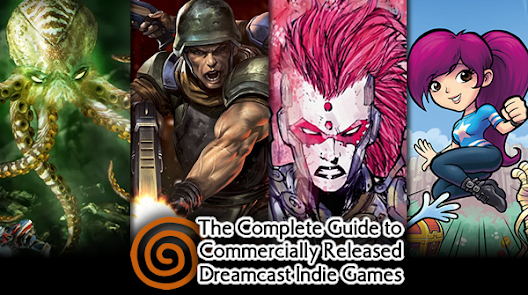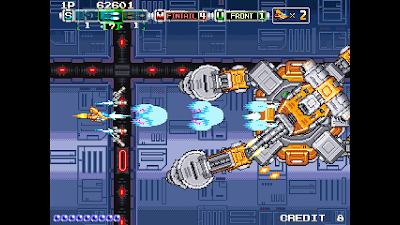Almost exactly two years ago the Junkyard published my review of Shadow Gangs, a side-scrolling beat ‘em up that was released for the Dreamcast in 2022, hot on the heels of a successful Kickstarter campaign. Perhaps due to a threadbare skillset, my personal experience of the game was less ‘beat em up’ and more ‘get beat up’, which I must admit detracted from my playing satisfaction quite a bit... Even so, I couldn’t deny that Shadow Gangs was a well polished effort with smooth, bug-free gameplay, an endearing art style and a thumping soundtrack. And, what’s more, the game was delivered to customers within the expected timeframe without any fuss or bother - a commendable feat that is far from guaranteed in our niche community (or in gaming more widely for that matter).
Why the hell am I bringing this up again? Oh, yeah, JKM Corp have now confirmed that Master Dan, the protagonist of Shadow Gangs, will be making a triumphant return to the Dreamcast in Shadow Gangs Zero, a Kickstarter for which shall be launching on Thursday 1 August. Though, as Zero is actually a prelude not a sequel, perhaps this marks an arrival rather than a return?! Theories of time and space are not my forte, so let’s side-step that rabbit hole and get down to business: what exactly is Shadow Gangs Zero and why should Dreamcast enthusiasts care about it?

Well, as I said above, Shadow Gangs Zero is a prequel to Shadow Gangs, and although it is sticking to the same fundamental beat ‘em up formula, there are a significant number of differences to be aware of. First of all, rather than being developed primarily for the Dreamcast and PC, the primary console which Shadow Gangs Zero is being built for is the Neo Geo. Apparently Ali Jakamy, head honcho over at JKM, had some time on his hands awaiting the submission of art and animations commissioned for Shadow Gangs II, and instead of taking a well-earned break, he couldn’t help but try to get Shadow Gangs running on SNK’s mid-90s powerhouse. Of course, with his enthusiasm unbound, that little tinkering project quickly escalated into the full scale production of the 16-bit 320*224 resolution prequel that we are now discussing here.

So, the Dreamcast version will be a port from a lesser console (a fucking great console, yes, but still lesser) something which may not excite those who are seeking indie titles that push the capabilities of our beloved little white box. However, Ali has assured us that the Dreamcast version will be a native port (no ROMs running on Neo Geo emulators here) and will make use of the Dreamcast’s hardware to deliver more colours, as well as rumble and VMU saving. Given his record with the first game, we have little reason to doubt that the Dreamcast version will be solid from a technical standpoint.
The other key characteristic which will differentiate Shadow Gangs Zero from its predecessor is that it shall be designed to deliver a home console experience, as opposed to an arcade-like one. In practical terms, what that appears to mean is: a) a shift away from brutal difficulty, and b) a longer and more in-depth game. The former aspect will be delivered through the binning of time limits and deaths from falls, as well as the addition of mid-level health pickups. The latter seems to come down to the provision of longer and potentially more levels, as well as opportunities to discover different scenarios through replaying the game with different characters or settings.
From what I can gather, Shadow Gangs Zero is not going to be entirely new. It seems that some of the settings and assets from the initial game will travel across, and so it may come down to interpretation whether it is to be viewed as a thoroughly substantial remake or a standalone new entry. We’ve been assured that many significant distinctions, such as those I outlined above, are nailed on and that owners of the first entry will have reasons to go in for the prequel. However, the extent of differentiation between the two entries will also ultimately come down to whether certain stretch goals (e.g. the inclusion of a two-player mode or composition of new music by Naim Soufiane) are met, leaving the matter somewhat open-ended until the conclusion of the funding campaign window.

Now, moving on to what we know about the funding and publication of the game. As already mentioned, a Kickstarter campaign will be launched on Thursday the 1st of August. Although we don’t know the exact funding goal, Ali has informed us that it will be higher than that of Shadow Gangs (£25,000). This is because the money raised shall be covering development costs, rather than simply covering manufacturing costs (at the point of going to Kickstarter the original Shadow Gangs was all but finished, whereas Shadow Gangs Zero is currently only about 10% towards completion). However, while the funding goal shall be higher, the pricing for the Dreamcast versions will be the same as the first time around. Given how early the game is in its development, timelines are inevitably very tentative at this point, but JKM Corp have told us that they are hoping to deliver the Neo Geo version of Shadow Gangs Zero by December 2025, and the Dreamcast and Mega Drive/Genesis version by March 2026.
Interestingly the publishing duties (printing, sales, distribution etc.) shall be managed by PixelHeart rather than WAVE Games Studios this time around. Ali informed us that this is down to former's expertise/experience in releasing Neo Geo games, which makes sense. The shift is probably not too surprising either given that WAVE seem to have taken a breather in 2024. Of course, the hibernating Norwich-based studio handled the first Shadow Gangs release with aplomb, but we know PixelHeart are a well oiled machine when it comes to matters of manufacturing and distribution too, and will likely be a safe pair of hands for Shadow Gangs Zero.

That’s about as much as we can share for now. More details may well be available when the Kickstarter launches on Thursday the 1st of August, so if you are interested then be sure to bookmark the page. As always, we’d love to hear your thoughts in the comments section below - is Shadow Gangs Zero a title you’ll be backing immediately or are you going to give it a pass?





.jpeg)
































